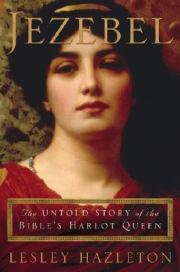 I have deep respect for Lesley Hazleton. In some ways I want to be her—internationally-savvy, fantastic voice and accent, able to read the Bible in Hebrew. When I heard that she was investigating the story of the Bible’s harlot queen with Jezebel, I was excited to get a better picture of both the Bible and of the way women’s sexuality has been used against us throughout history.
I have deep respect for Lesley Hazleton. In some ways I want to be her—internationally-savvy, fantastic voice and accent, able to read the Bible in Hebrew. When I heard that she was investigating the story of the Bible’s harlot queen with Jezebel, I was excited to get a better picture of both the Bible and of the way women’s sexuality has been used against us throughout history.
A New Midrash—Interweaving History and Narrative
Jezebel is written from a variety of angles. Hazleton mixes a direct retelling of the story based her own translations from the Hebrew Bible with stories of her travels to the historical places (two especially telling anecdotes involve Christian fundamentalists at the site of Armageddon gleefully calculating how much blood it will take to fill the valley and Hazleton’s attempts to find a holy site that has nearly been erased by history). Hazleton also includes imagined looks at the events of Jezebel’s lifetime from the point of view of the queen herself.
“It is easy to forget that [the Bible] was written by specific men in specific times and places, for specific reasons.” – Lesley Hazleton
This unexpected mix of approaches gave me a more complex view of the stories and the players. Shifting through time allowed Hazleton to make comparisons to modern day politics in the Middle East. I like to think Jezebel was like reading a new Midrash (most everything I know about the Old Testament, I know from reading Davita’s Harp).
Reading the Bible through the Eyes of Others
I am no Biblical scholar—I wasn’t raised with any more religion than I could glean from the (Christian) cultures I grew up in and from books. When I tried to read the King James translation for myself, I never got past the begats. That is to say, my experience of the Bible has always been filtered through the experiences of others. So I loved hearing stories of ancient gods, kings, and queens and their struggles for power. It is clear that Hazleton brought to this book an admiration of Ahab and Jezebel. And the comparisons to modern politics were apt and informative. I appreciated that Hazleton was trying to remove the mask of Orientalism and I could see ways in which a religion is shaped by its believers.
What did not work for me were the moments when Hazleton imbued the scenes with what Jezebel must have been thinking. She did a solid job of outlining the character and I liked the fierce strength and nobility that Hazleton attributed to her, but it was more of a leap into story than I was willing to take.
Overall, it was refreshing to get a contemporary, female view of the Bible. But in the end, I realized that the only way to satisfy my need to get my own full understanding will be to learn Hebrew and read the Bible for myself.
Women Aren’t Sexual Beings—We Are Whole Beings
I was intrigued by the idea of a “harlot queen.” The word “harlot” and its brethren “bitch, slut, whore” and so many others are still used against women today and usually in instances that have everything to do with power and nothing to do with sex.
What I found interesting about Jezebel is that Hazleton removes sex from the equation entirely. A book I thought might be about how female sexuality is positive (rather than negative) turned out to be about the power of a woman as a person. Perhaps this is the more important leap because a person is entitled to power and sexuality and entirety.
I realized that my own investigations into sexuality and feminism with my new novel might be limited. I have been fighting to understand female sexuality and have it seen as equal to that of men. Perhaps instead I should be looking at women as whole people. Maybe I have allowed the very people who seek to minimize my sex to set the terms of this battle.
If this review made you want to read the book, pick up a copy of Jezebel: The Untold Story Of The Bible’s Harlot Queen from Bookshop.org. Your purchase keeps indie booksellers in business and I receive a commission.